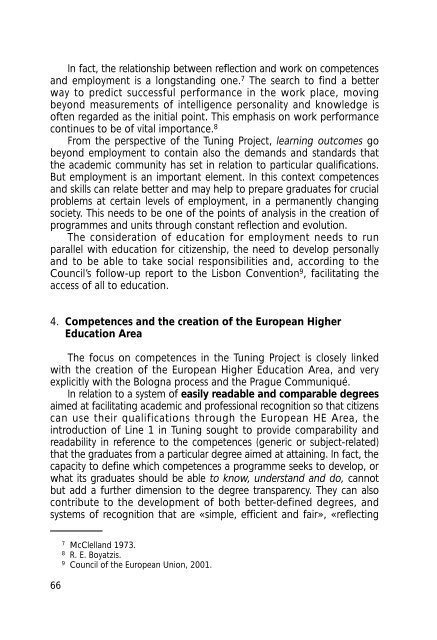Final Report Pilot Project - Relaciones Internacionales de la ...
Final Report Pilot Project - Relaciones Internacionales de la ...
Final Report Pilot Project - Relaciones Internacionales de la ...
Create successful ePaper yourself
Turn your PDF publications into a flip-book with our unique Google optimized e-Paper software.
In fact, the re<strong>la</strong>tionship between reflection and work on competences<br />
and employment is a longstanding one. 7 The search to find a better<br />
way to predict successful performance in the work p<strong>la</strong>ce, moving<br />
beyond measurements of intelligence personality and knowledge is<br />
often regar<strong>de</strong>d as the initial point. This emphasis on work performance<br />
continues to be of vital importance. 8<br />
From the perspective of the Tuning <strong>Project</strong>, learning outcomes go<br />
beyond employment to contain also the <strong>de</strong>mands and standards that<br />
the aca<strong>de</strong>mic community has set in re<strong>la</strong>tion to particu<strong>la</strong>r qualifications.<br />
But employment is an important element. In this context competences<br />
and skills can re<strong>la</strong>te better and may help to prepare graduates for crucial<br />
problems at certain levels of employment, in a permanently changing<br />
society. This needs to be one of the points of analysis in the creation of<br />
programmes and units through constant reflection and evolution.<br />
The consi<strong>de</strong>ration of education for employment needs to run<br />
parallel with education for citizenship, the need to <strong>de</strong>velop personally<br />
and to be able to take social responsibilities and, according to the<br />
Council’s follow-up report to the Lisbon Convention 9 , facilitating the<br />
access of all to education.<br />
4. Competences and the creation of the European Higher<br />
Education Area<br />
The focus on competences in the Tuning <strong>Project</strong> is closely linked<br />
with the creation of the European Higher Education Area, and very<br />
explicitly with the Bologna process and the Prague Communiqué.<br />
In re<strong>la</strong>tion to a system of easily readable and comparable <strong>de</strong>grees<br />
aimed at facilitating aca<strong>de</strong>mic and professional recognition so that citizens<br />
can use their qualifications through the European HE Area, the<br />
introduction of Line 1 in Tuning sought to provi<strong>de</strong> comparability and<br />
readability in reference to the competences (generic or subject-re<strong>la</strong>ted)<br />
that the graduates from a particu<strong>la</strong>r <strong>de</strong>gree aimed at attaining. In fact, the<br />
capacity to <strong>de</strong>fine which competences a programme seeks to <strong>de</strong>velop, or<br />
what its graduates should be able to know, un<strong>de</strong>rstand and do, cannot<br />
but add a further dimension to the <strong>de</strong>gree transparency. They can also<br />
contribute to the <strong>de</strong>velopment of both better-<strong>de</strong>fined <strong>de</strong>grees, and<br />
systems of recognition that are «simple, efficient and fair», «reflecting<br />
66<br />
7 McClel<strong>la</strong>nd 1973.<br />
8 R. E. Boyatzis.<br />
9 Council of the European Union, 2001.


